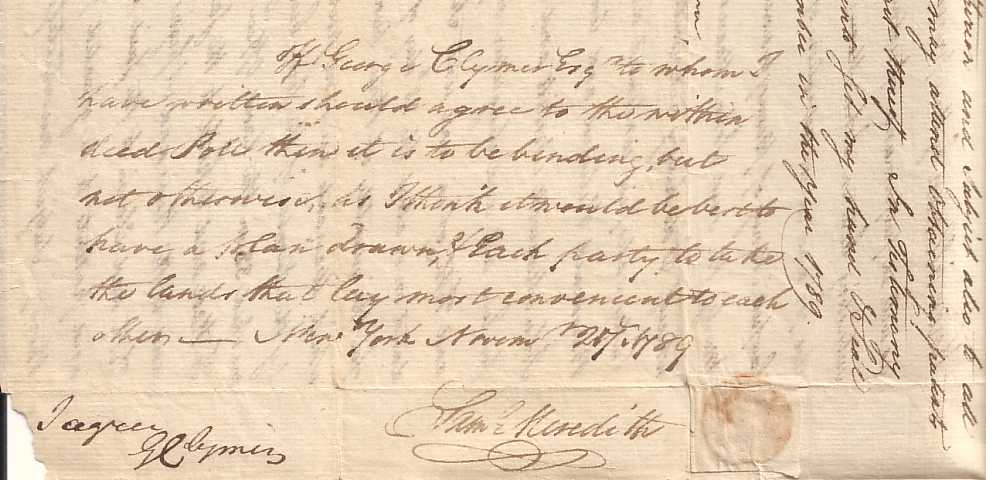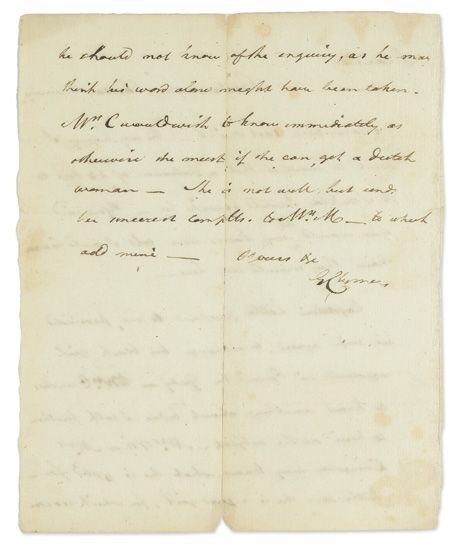CLYMER, George (1739-1813), Signer (Pennsylvania ). Autograph letter signed ("G Clymer") to Samuel Meredith in Philadelphia; Jamaica Plains [Massachusetts], 4 September 1774. 3½ pages, folio, address panel on page 4, postmarked "BOSTON", very discreet repairs at some fold intersections . PREMONITIONS OF LEXINGTON AND CONCORD: CLYMER REPORTS FROM REVOLUTIONARY BOSTON: "...THE LEAST MOVEMENT OF THE [BRITISH] TROOPS" HE REPORTS, "WILL BE FOLLOWED BY A GENERAL INSURRECTION..." A remarkable, lengthy and wide-ranging report on revolutionary ferment in Massachusetts, seven months before the alarms at Lexington and Concord, by a Pennsylvania patriot visiting Boston. At this time, Boston was under martial law, the colonial legislature suspended and the port blockaded. Clymer was an eyewitness to revolutionary activities in Cambridge and here foresees the outbreak of organized, armed resistance to British authority. On September 1, at the order of General Gage, British soldiers had seized gunpowder stored in the Provincial Powder magazine as well as two small cannon at Cambridge. The following day, as Clymer witnessed and describes, thousands of people gathered on Cambridge Common and in Harvard Square in protest, demanding the resignation of three Cambridge residents named to the Crown's Mandamus Council. Clymer praises the beauty of the country around Boston, where he has been visiting, and observes that in Massachusetts, "nothing but the most guarded Conduct on the part of the General [Gage]" can prevent armed resistance, "for the least movement of the [British] Troops" he reports, "will be followed by a general Insurrection. It is very near it now." Government is suspended, he notes, and "there is an entire stop to Law as administered under the new Constitution. The judges will not go to the Circuit Courts--the country Counsellors have mostly flown from Town...transports are about sailing for new Troops, from Quebec as they say, and on the Alarm on Friday at Cambridge...a Frigate has been brought directly between the two ferries [on the Charles River], the Guard at the Neck doubled and Cannon added. In short every motion of the General seems directed rather to his own Security than to the idle Project of subjecting the People to the Authority of his Master [the King]." "Hearing of a large Assembly of People at Cambridge, I rode across the Country on Friday, and found several thousands there. They had come from distant parts of the County to force the Resignation of the Counsellors who live at Cambridge, and did not retire till Oliver Lee [Clymer has conflated Lt. Gov. Thomas Oliver and Judge Joseph Lee] and Davenford [Judge Samuel Danforth] had fully resign'd...." [Oliver, Lee and Danforth were loyalists named to the King's Mandamus Council in the wake of the suspension of the assembly.] Clymer praises the restraint shown by the patriots: "I admired...the good Order they preserved, there was not the least Disorder Tumult or Noise among such a great Multitude...I cannot conceive what hopes of Success the King's Troops could have even if they were six times as numerous, as they are against such People," especially as the terrain "it appears to me...so fit for an irregular [guerilla] War." It is clear to Clymer that the patriots are ready to resist if attacked: "These People had mostly left their Arms at one of the Towns nearest to Cambridge where they intend to make a stand in case they had been attacked by the Kings Troops...." Finally, Clymer comments on the discovery of "the Treachery of the Old Game Cock Brattle" (loyalist General William Brattle), one of whose secret letters to General Gage had been found in the street, confirming his support of the crown. "Those called tories here tremble even in Boston...." Clymer observes pointedly. Turning to affairs in his own province, Clymer is critical of Pennsylvania's choice of delegates to the first Continental Congress: "The devil take those that rejected the additional deputies
CLYMER, George (1739-1813), Signer (Pennsylvania ). Autograph letter signed ("G Clymer") to Samuel Meredith in Philadelphia; Jamaica Plains [Massachusetts], 4 September 1774. 3½ pages, folio, address panel on page 4, postmarked "BOSTON", very discreet repairs at some fold intersections . PREMONITIONS OF LEXINGTON AND CONCORD: CLYMER REPORTS FROM REVOLUTIONARY BOSTON: "...THE LEAST MOVEMENT OF THE [BRITISH] TROOPS" HE REPORTS, "WILL BE FOLLOWED BY A GENERAL INSURRECTION..." A remarkable, lengthy and wide-ranging report on revolutionary ferment in Massachusetts, seven months before the alarms at Lexington and Concord, by a Pennsylvania patriot visiting Boston. At this time, Boston was under martial law, the colonial legislature suspended and the port blockaded. Clymer was an eyewitness to revolutionary activities in Cambridge and here foresees the outbreak of organized, armed resistance to British authority. On September 1, at the order of General Gage, British soldiers had seized gunpowder stored in the Provincial Powder magazine as well as two small cannon at Cambridge. The following day, as Clymer witnessed and describes, thousands of people gathered on Cambridge Common and in Harvard Square in protest, demanding the resignation of three Cambridge residents named to the Crown's Mandamus Council. Clymer praises the beauty of the country around Boston, where he has been visiting, and observes that in Massachusetts, "nothing but the most guarded Conduct on the part of the General [Gage]" can prevent armed resistance, "for the least movement of the [British] Troops" he reports, "will be followed by a general Insurrection. It is very near it now." Government is suspended, he notes, and "there is an entire stop to Law as administered under the new Constitution. The judges will not go to the Circuit Courts--the country Counsellors have mostly flown from Town...transports are about sailing for new Troops, from Quebec as they say, and on the Alarm on Friday at Cambridge...a Frigate has been brought directly between the two ferries [on the Charles River], the Guard at the Neck doubled and Cannon added. In short every motion of the General seems directed rather to his own Security than to the idle Project of subjecting the People to the Authority of his Master [the King]." "Hearing of a large Assembly of People at Cambridge, I rode across the Country on Friday, and found several thousands there. They had come from distant parts of the County to force the Resignation of the Counsellors who live at Cambridge, and did not retire till Oliver Lee [Clymer has conflated Lt. Gov. Thomas Oliver and Judge Joseph Lee] and Davenford [Judge Samuel Danforth] had fully resign'd...." [Oliver, Lee and Danforth were loyalists named to the King's Mandamus Council in the wake of the suspension of the assembly.] Clymer praises the restraint shown by the patriots: "I admired...the good Order they preserved, there was not the least Disorder Tumult or Noise among such a great Multitude...I cannot conceive what hopes of Success the King's Troops could have even if they were six times as numerous, as they are against such People," especially as the terrain "it appears to me...so fit for an irregular [guerilla] War." It is clear to Clymer that the patriots are ready to resist if attacked: "These People had mostly left their Arms at one of the Towns nearest to Cambridge where they intend to make a stand in case they had been attacked by the Kings Troops...." Finally, Clymer comments on the discovery of "the Treachery of the Old Game Cock Brattle" (loyalist General William Brattle), one of whose secret letters to General Gage had been found in the street, confirming his support of the crown. "Those called tories here tremble even in Boston...." Clymer observes pointedly. Turning to affairs in his own province, Clymer is critical of Pennsylvania's choice of delegates to the first Continental Congress: "The devil take those that rejected the additional deputies













Testen Sie LotSearch und seine Premium-Features 7 Tage - ohne Kosten!
Lassen Sie sich automatisch über neue Objekte in kommenden Auktionen benachrichtigen.
Suchauftrag anlegen